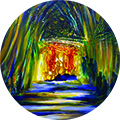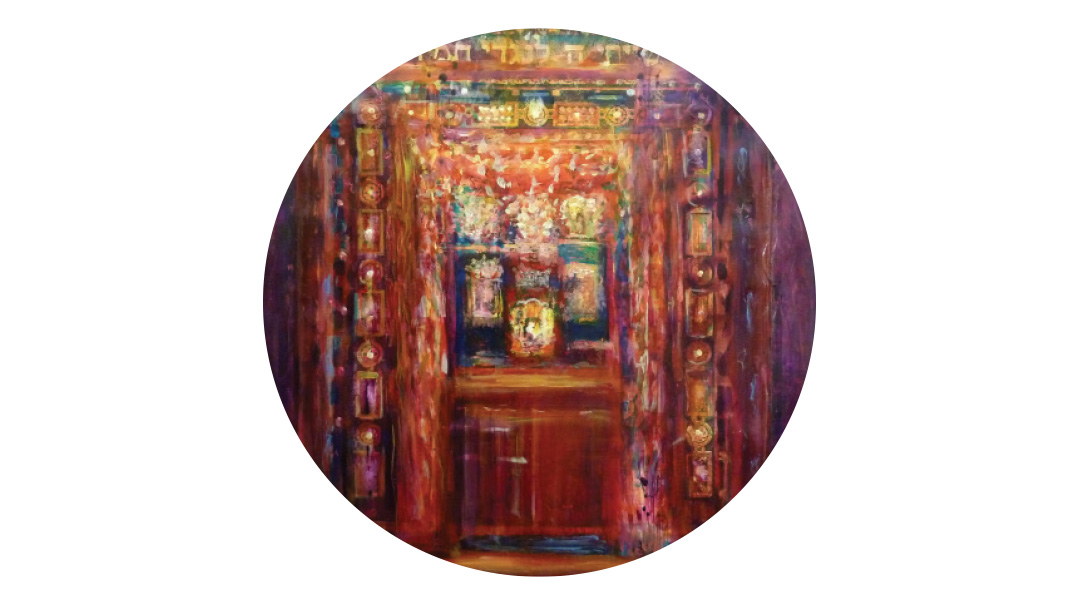From Home Run to Home One


Chanukah draws us back to our home
A friend shared a mini-episode from her life that turned out to be a great metaphor for the contrast between the public and private arena.
Within less than a minute of limping into her humble abode after attending a gala affair, my friend’s contact lenses were happily ensconced in her lens case and her glasses were re-perched on her nose. Her fresh-from-the-sheitelmacher sheitel was resting slightly askew on the sheitel head while her comfortable-as-an-old-shoe-snood was on her head. Her high-heeled shoes lay sprawled in the corner while her feet luxuriated in her delicious slippers… when there was a knock on the door.
It took her a second to realize why the eyes of the young girl — who had come to bring over something she’d left in her ride’s car — widened in surprise at the sight of her. Then she caught a glimpse of herself in the hall mirror and understood. In the two minutes since she had walked in the front door, she had metamorphosed from Cinderella at the ball, to Cinderella, scullery maid.
All those beautifying agents that constrict, confine, cramp, compress, crush, and contour are great metaphors for the inhibition that the public arena imposes in all areas of our lives. Walking outside our front door always involves some sort of posturing and pretension — even when we’re wearing sneakers. Even the most honest and authentic among us will shift in some ways when in public.
“Kol ha’adam kozeiv — all men are liars,” Dovid Hamelech said in Tehillim. This doesn’t mean that all people are dishonest. It means that there’s an intrinsic deception endemic to the human condition. We always hide much more about ourselves than we reveal. Even if you can rattle off someone’s daily schedule or you know their family tree back to their fifth cousin thrice removed, it doesn’t mean you know anything of real substance about them.
The neighbors of some nondescript person suddenly accused of a crime are often quoted as saying wonderingly, “Who would have guessed? I just saw him bringing in the paper two days ago!” — as if the very fact that you had him neatly tagged into a cubbyhole in your mind should have kept him from being a criminal.
All those trivial little soundbites and snippets we gather about people to help us make sense of our world don’t add up to all that much knowledge at the end of the day. And that’s not always a bad thing.
Human beings tend to hide much more than they reveal — and not telling the whole truth definitely has its place. There’s nothing wrong with the fact that I don’t know my neighbor’s innermost struggles or dreams or hopes. I don’t even necessarily want to know more than I do, as I smile politely on my way to take out the garbage. The affectation we tend to adopt in the public sphere is what keeps society functioning without getting bogged down.
The danger is when we let that superficial, inauthentic posturing that the public domain demands slip into the private domain — our homes.
Borders and Boundaries
What makes a private arena private is that it’s not public. Whether they’re made of brick, concrete, or sheets strung up on a string, the walls that delineate a private sphere from a public one are there to create an inner space that is protected not only from the elements but also from the seeing eyes and hearing ears of the public arena.
This is true on a simple day-to day-level — there are some activities that are perfectly appropriate in a private arena but are not so in a public one. Sipping soup in our succah a couple months ago, someone joked about what would happen if a giant came along and plucked away our succah walls, revealing the Kosman family nestled in the middle of the sidewalk, spoons in hand, please pass the salt.
But on a more fundamental and profound level, if the public arena demands a certain level of pomp and pretension, it’s the private arena that allows us to access our deeper, truer, and more authentic selves. Indeed, people who spend all their time in the public sphere sometimes complain that the public sphere not only silences one’s inner self, it might strangle it completely.
We’re told that a person “learns most of his wisdom at night.” Even the beis medrash, that fortress of truth, is a “public space” full of noise, people, and movement. It is at night, in quiet solitude, that we have the greatest connection to true wisdom.
Yet increasingly, instead of cherishing the oasis of authenticity the home offers, we spend more of our time escaping home. For the best of reasons — work, exercise, fun, appointments, camaraderie — we spend less and less of our time at home, and more and more out in the public, both literally outside the walls of our home, and figuratively, in public spaces with the Internet.
We seem to find the call of the public arena irresistible. Perhaps we prefer to live in a world peopled by one-dimensional, happy-faced mannequins whose lives are full of adventures — culinary and otherwise — that we can access with a flick of our keyboard.
There’s something appealing and ego-stroking in the solid accomplishments that work life offers, in contrast to running a home where the accomplishments of a good cooked meal or an empty laundry basket are washed away hourly by the tsunami of life. It’s more compelling to cultivate “status” than invest in building one’s essence. It’s less demanding to follow the masses than to forge your own individual path to Hashem. It takes less out of a person to put up a fa?ade than to have the courage to be authentic.
And then comes Chanukah.
Right Makes Might
In a very real way, Chanukah is a celebration of the home. On Chanukah, the home, whose strength comes specifically from its hiddenness from the public eye, does the world a favor and allows some of its brilliant light to shine out into the public realm.
This message is brought out powerfully in the phrasing of al hanissim. It was indeed a military miracle that the strong fell into the hands of the weak, but, one wonders, what do the words “many into the hands of the few” add to that miracle? Generally, the strong are many — that’s part of what makes them strong. And how does noting that the impure fell into the hands of the pure, or the righteous into the hands of the wicked, add to the military miracle? Being righteous or pure does not necessarily limit your military prowess.
Rav Moshe Shapiro explains that the reason for this wording is that al hanissim is celebrating not only the actual military triumph but the triumph of specifically those qualities that generally do not win in this world. The exact qualities that generally put one at the bottom of the totem pole in this world suddenly came out on top. Strength, might, power, brawn, stature, renown retreated in face of the forces of weakness, smallness and purity. In this instance, the qualities of might were vanquished by the qualities of right. The very traits that usually lose, won.
No matter how many times we hear it, somehow it doesn’t sink in. In Judaism it’s not a plus to be mighty, strong, prominent, or “out there.” “Not because of your abundance over all the nations has G-d desired in you and chosen you, but because you are the fewest of all the nations” (Deuteronomy 7:7). It is specifically “weakness” and “fewness” that gives one the winning edge in Judaism. Perhaps this is because when I’m “weak” and “few,” there is room for Hashem in my life. I harbor no illusions that I am running the world or that everything is in my control.
Chanukah and Women
While people tend to get up in arms about this, in many ways a woman’s role in Judaism is less prestigious, less powerful, and certainly less prominent than that of men. Instead of expending huge amounts of energy trying to prove that this isn’t true, perhaps we can take a step back and realize that even if it is true, that’s not necessarily a bad thing — especially from a spiritual-truth perspective. Perhaps it’s specifically the private, more feminine arena, far from the public eye, that holds the key to spiritual triumph.
In Judaism, the female persona is intimately bound up with the home, the quintessential private arena. “Behold she is in the tent,” Avraham says to the angels in praise of Sarah. “I call her not my wife,” Rabi Yossi says, “I call her my home.”
It is not in the public sphere, but in the home/ohel — that fortress of internality — where a person meets his real self and where real growth germinates. This idea is born out in a breathtakingly beautiful insight revealed in a seemingly prosaic halachic principle about the prohibition against carrying something from a public domain to a private domain on Shabbos.
While a public domain has a ceiling of ten tefachim, the airspace above ten tefachim is no longer considered a public domain — a private domain “stretches up to the heavens” (reshus hayachid oleh ad harakia, Shabbos 7a). So, for example, based on this principle, the Gemara can discuss whether it’s considered “carrying” if one tossed an item from one private domain to another over a public domain but the object remained in the air ten tefachim above the ground at all times.
But on another level, this law — that the private domain extends to the heavens — is, at its root, a statement of true reality. There’s much to be accomplished in the world outside our front door, but no matter how much we hustle and bustle, no matter how much noise and action we stir up, no matter how many stories the skyscrapers have, the intrinsic superficiality of the public realm always puts a cap on the heights one can reach. It is only in the reshus hayachid, in the private realm, within the home, that one can really soar. Not weighed down by the demands and expectations, the conniving and contriving of the social arena, one is free to access the Truth of all truths.
Bais Yaakov
Consistent with the theory we’ve explored in this column over the years — that the female persona often parallels that of the quintessential Jew — it’s fascinating to note that not only are women closely entwined with the idea of the internally focused ohel, but so is Yaakov Avinu.
In contrast to Eisav, the hunter — cunning, predatory, powerful, whose sphere of activity is outside — Yaakov sits cloistered in his ohel, delving into the wisdom that’s only accessible in that private place.
Yaakov and Eisav’s diametrically opposed worldviews come to a head in a historic encounter. Deep within their interchange lies the eternal struggle that continues to this day in our own minds and hearts.
In a sudden burst of friendliness, Eisav asks Yaakov to join forces with him. Yesh li rav. I have tons of stuff. I am strong. I am powerful. Do you know what the two of us can accomplish together? Oh, the places we will go and the things we will do!
But Yaakov, the ish ohalim, declines his offer. “V’etnahela l’iti,” Yaakov says. I will go ahead slowly, accommodating the needs of my children and my flock. My life is not about conquest, about acquisition, about production. The lights, camera, action — the likes, fans, and followers — that beguile you don’t speak to me. My focus is not on the grand slam but on stepping up to the plate to do what needs to be done.
Translating Yaakov’s sentiments into today’s parlance is enough to bring on a Sheryl Sandberg–induced cringe. Sandberg, COO of Facebook, urged women to “lean in” to success in her best-selling book. What could be less “leaning in” than saying that one’s progress in life will be determined by our responsibilities toward others? Where is your sense of ambition? Your drive? Your ego?
But as the Chanukah story teaches us, life is not really about dazzle and show, not about get up and go. We light the Chanukah menorah inside the house, but we place it at the window or the doorway. It’s the radiance emanating from within the home, from the “weak” and from the “few” — not from the multitudinous, mighty public zone — that ultimately lights up the darkness.
Being a yosheiv ohalim, as well as being ba’ohel, is not only a physical description, it is also a state of mind. Most of Yaakov Avinu’s life was spent outside the ohel, dealing with very un-ohel like people. And, indeed many women today are impelled by life circumstances to be out there in the world. But the ohel is something that the Jewish people in general, and Jewish women in particular, have carried with them throughout history — wherever they found themselves physically — giving thanks to Hashem for the light they carry within that shines out into the darkness.
Originally featured in Family First, Issue 620. Miriam Kosman is a lecturer for Nefesh Yehudi, an Israeli outreach organization, which teaches Torah to thousands of Israeli university students each year, and author of Circle, Arrow, Spiral: Exploring Gender in Judaism.
Oops! We could not locate your form.







